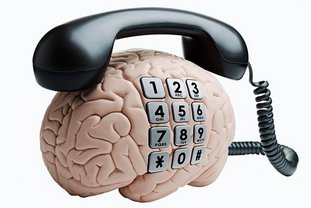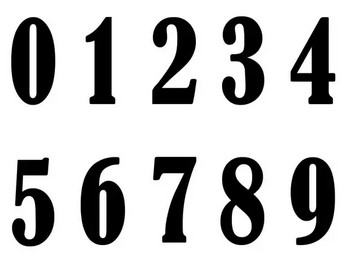Can You Remember Phone Numbers?
 Maybe the question should be why would you want to remember phone numbers.
Maybe the question should be why would you want to remember phone numbers.
Virtually everyone uses a smartphone these days, and one of the benefits of them is that you don’t need to memorise phone numbers, they’re all there, in that smart little gadget you carry round with you. And you can retrieve them easily and quickly … so why would you want to memorise them?
Why memorise phone numbers?
Actually there are some good reasons why you might want to memorise phone numbers, and, in fact, numbers in general. Such as …
- It’s good to have them memorised in case your phone is on the blink/stolen/missing/out of charge/hacked.
- Memorising them is good mental exercise.
- It adds to your self-confidence to know you can memorise things (and if you can do this, you can do other feats of memory).
- We could all do with the skill of memorising medical numbers, account numbers, etc, and having them available in any situation.
- It opens up the possibility of memorising historical facts (or sporting facts/statistics, or celebrity facts, etc).
- It’s a skill that, once learned, will benefit you for the rest of your life.
- The more you use the skill, the more proficient you’ll become.
- It puts you in a select minority – most people would love a better memory, very few actually do something about achieving it.
Okay, so how can you learn to memorise numbers?
Firstly, let’s be honest, numbers are amongst the hardest things to remember. And that’s because they are faceless, indistinct things, without character. And they can seem vague, hard to grasp, and downright awkward to keep locked away in your memory (and even when you’ve memorised them, they can easily become confused).
But that’s if you use the old fashioned method of repeating them in your mind till they somehow ‘stick’. And even then, they’re not really memorised long term, which is why they can become easily confused (see above). But what if there were a way to memorise numbers properly, and one that actually works …
Well actually, there’s a very old and very clever system of number memorisation that been around for a long, long time. In fact it has its roots in the 17th century, and comes under different names, most notably the Major System. It gives numbers the same individuality that letters and words have. And once they have that, there really is something for the brain to grasp onto! You want proof? Think how easy it is to remember a poem or rhyme you learnt years ago, or a jingle off a TV commercial – they tend to stick around in your memory for years, even when you’d rather forget them!
The major system
 The major system is based on sounds rather than letters. As children we had to learn the alphabet of 26 letters before we could read and write effectively. With the major system we only have to learn an ‘alphabet’ of sounds for 10 digits. Just 10! Because no matter how large a number is, it only comprises those 10 individual digits.
The major system is based on sounds rather than letters. As children we had to learn the alphabet of 26 letters before we could read and write effectively. With the major system we only have to learn an ‘alphabet’ of sounds for 10 digits. Just 10! Because no matter how large a number is, it only comprises those 10 individual digits.
Here’s a list of the 10 digits, with the sounds associated with them in the major system:
0 s, z. Zero starts with a z sound.
1 t, d, th. The letters t and d have just one downstroke.
2 n, which has two downstrokes.
3 m, which has three downstrokes.
4 r, and the word ‘four’ has 4 letters, and ends with an ‘r’.
5 l, and l is 50 in Roman numerals.
6 j, sh, ch, soft g (as in genius). The letter J is a bit like 6 turned round.
7 k, hard c (as in cat), hard g (as in gun).
8 f, v, ph. A handwritten f is a bit like an 8.
9 p, b. Both p and b are a bit like a 9 turned round.
I must stress that although I’ve specified letters in the list, these digits are associated with the sounds made when you say the letters. So you have to think of cat, for example, as sounding as though it were spelt kat, and genius as though it were spelt jeanius. Once you grasp that, you’re off and running!
Now you can ‘translate’ any number into words or phrases. So, for example, for 7116 you might think of ‘cat dish’ (71 could be k t and 16 could be d sh). But there are other options. You might choose ‘cod teach’. In this case, the 71 becomes cod and the 16 becomes teach.
What about the vowels?
It’s worth explaining here that with the major system you can add vowels anywhere you like. Feel free to add them in the middle of a word, or even at the beginning or end, it’s up to you. As long as it helps you make some useful word or phrase, that’s fine. Incidentally, if you have a double letter in the word (as in letter), then you ignore the fact that there are two letters. Remember, it’s the t sound that’s important, not the actual spelling. So letter becomes (in your mind) ltr.
When you’re new to the major system, you can make simple words using any two numbers, and as long as you can come up with something that’s easier to remember than the actual number itself, then you’re making progress. And the words can be nouns, verbs or adjectives, or whatever you like.
Start easy, then extend your range
But of course you can also extend to three digits, or even more. And when you do that, you will find it easier to make some interesting little words and phrases, and they will be a lot easier to remember than the numbers they represent.
As an example, let’s say you needed to memorise this number: 74146700. You could make something of each set of two digits and come up with something like ‘car door check zoo’. That would be easier to recall than the number. But if you managed to extend your ranges so that you used more than two digits at a time, you might come up with a phrase like: ‘cartridge cases’. And that would be even better! It’s all a matter of practise.
Make a vital link in each little mental video
This is a very important step, otherwise you might end up with a stack of memorised numbers and no idea what each of them refers to. So when you’ve come up with some useful words or phrases, link them together into a little scene or story, and link it to the person or business involved. For example, when memorising a phone number don’t do it randomly, instead introduce a mental image of the person who’s phone number you’re memorising.
Let’s say you’re memorising Rachel’s phone number and the phrases you convert the number to are “Small penguins Saturday” (and that would be … let’s see … 03512 420 0141), then when you’re visualising those small penguins, perhaps on a couch watching their favourite Saturday evening TV show, then put Rachel in the picture with them (maybe she’s throwing them the occasional sardine treat). That way, Rachel is always and indelibly attached to her phone number 🙂
Or if it’s a bank-related number (e.g. account number, card number, etc), you could include an image of the actual bank in your little mental video. For medical numbers, you could include a mental image of a hospital, or a doctor. If it’s a number relating to a business (account number, order number, etc), include a mental image of the business involved.
A few simple ‘rules’
There are no strict rules to the major system, as long as you stick to whatever you see as a rule. But the rules, such as they are, are as follows:
- Use the sounds related to each digit
- Ignore double letters (unless each is pronounced differently and separately, as in accident – aKSiDNT – 70121)
- Ignore the sound of any vowels in words you create
- Add vowels to fill out words to suit yourself
- Use two or more digits to make words (the more digits, the longer the word)
- Make a vital link to the person/company/event/whatever involved
- Make your little mental videos peculiar, outrageous, funny, rude, disgusting, violent, or in some other way more likely to be easily remembered
Anki
If you want to become proficient with the major system, I can recommend using Anki. It’s a wonderful little free and open-source program that allows you to compile decks of flash cards, and then, when you use them, it logs whether you’re improving or not. If you’re not mastering a certain item, Anki will show it to you again and again. And if you have mastered an item, it will lay off showing it to you. In other words, it’s like a very intelligent and patient teacher, helping you go over the things you still need to learn, while leaving alone the things you’ve got to grips with.
One of the [many] great things about Anki is that you can download decks that other people have compiled. So if you’re learning Greek, for example, it’s a fair bet that other Anki users have compiled and uploaded several decks on the Greek language – lists of vocabulary, often-used phrases, and so on. So you can benefit from their good nature, and you, in turn, are free to upload decks of your own for other people to use.
Resources
You might want to visit this Wikipedia page on the major system. It’s a very comprehensive run down of the system, together with a very useful table of sample words.
This Art of Memory page is also very useful, again with numerous example words.You’ll also find an extensive list of memory resources here as well.
Numzi is a program that automatically converts numbers into words, so it can be a great help, particularly when you’re studying the major system, or you just want to find some additional words to the list you’ve already come up with.
And if you want to take on a real challenge, and something that will really boost your grasp of the major system, I can recommend “How To Memorize 101 Digits Of Pi In Less Than A Day: While Learning A Useful Life Skill” by Mark Stuart. You can order it on Amazon.com, or on Amazon.co.uk.
